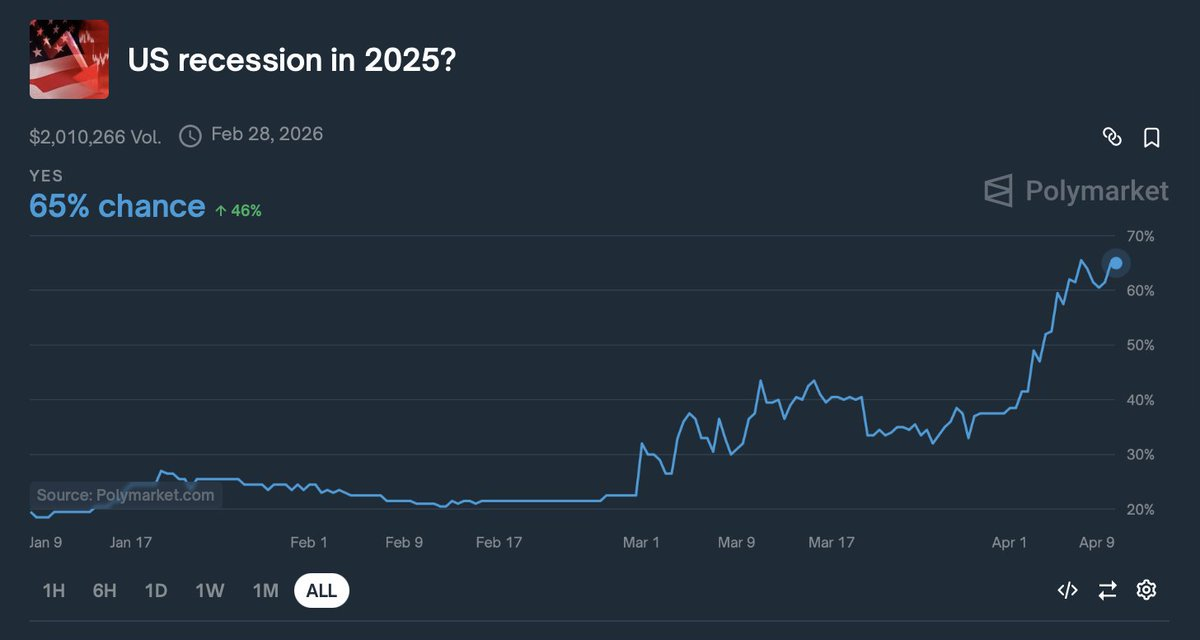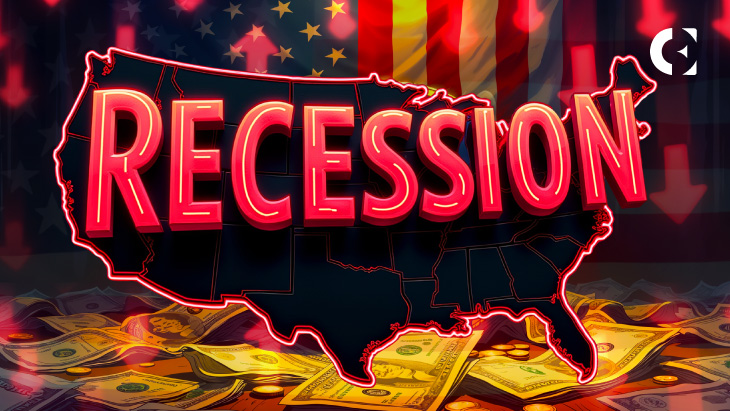- Polymarket shows high 65% odds for a US recession occurring during 2025
- Trump administration announces unexpected 90-day pause on new tariffs
- Recession odds on Polymarket stay elevated (65%) despite the 90-day tariff pause
The likelihood of a U.S. recession in 2025 has soared to 65% on blockchain-based prediction platform Polymarket.
Lingering effects of the earlier interest rate hike announcements, the trade policy shifts, and weakening market conditions, fuel the increase in perceived risk.
Why Are Polymarket Recession Odds Surging?
Speculators on Polymarket now assign a 65% probability to a U.S. recession this year, up from 26% when President Donald Trump took office in January.
The market defines a recession by the standard measure: two consecutive quarters of negative real GDP growth.

These odds show a steady climb over the recent weeks with growing concern among investors and analysts. Kalshi, another prediction platform, had placed recession odds at 18% at the start of the year.
Further compounding the probability, Goldman Sachs has raised its recession forecast to 45%, up from 35%. On the same note, JPMorgan estimates 60%. Notably, UCLA economist Clement Bohr said a downturn could still be avoided if Trump’s policies are rolled out gradually.
Factors Driving Recession Fears
The shift in sentiment is tied to macroeconomic trends and recent policy moves. The Federal Reserve’s aggressive interest rate hikes over the past two years have slowed economic activity, especially in rate-sensitive sectors such as housing and consumer spending.
Related: Engineered Recession Response? Theory Swirls as Tariffs Send Markets Reeling
Adding to market stress were concerns around recently announced US tariffs on Chinese goods, though news emerged today, of a 90-day pause to its implementation.
Prior to the halt, the tariff announcements contributed to market volatility, including a near 10% drop in major U.S. stock indices last week before a partial recovery.
How Might Recession Odds Impact Crypto?
The rising likelihood of a U.S. recession casts uncertainty over the cryptocurrency market, with major digital assets experiencing sharp declines and minor recoveries.
Major digital assets saw sharp declines earlier in the week before recovering alongside broader markets following news of the tariff pause. Bitcoin, for instance, briefly fell towards $74,700, while Ethereum dipped near $1,300 during that period, though both currently trade significantly higher (BTC ~$82.3k, ETH ~$1.6k at time of writing).
Related: Trump Tariffs Shock Markets: Crypto Loses $100B, Bitcoin Price Unstable
Analysts say cryptocurrencies, often considered high-risk assets, tend to follow the performance of tech stocks during economic downturns.
While some investors view digital currencies like Bitcoin as a hedge against traditional financial instability, the crypto market’s volatility may intensify if broader risk-off sentiment were to take hold again.
Disclaimer: The information presented in this article is for informational and educational purposes only. The article does not constitute financial advice or advice of any kind. Coin Edition is not responsible for any losses incurred as a result of the utilization of content, products, or services mentioned. Readers are advised to exercise caution before taking any action related to the company.







